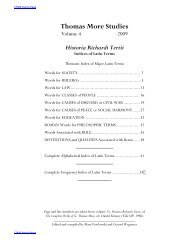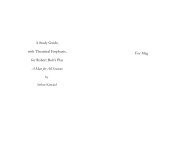life of john picus earl of mirandola - The Center for Thomas More ...
life of john picus earl of mirandola - The Center for Thomas More ...
life of john picus earl of mirandola - The Center for Thomas More ...
Create successful ePaper yourself
Turn your PDF publications into a flip-book with our unique Google optimized e-Paper software.
5<br />
10<br />
15<br />
20<br />
25<br />
30<br />
Picus’ Commentary on Psalm 15<br />
hope, that it shall arise in the Day <strong>of</strong> Judgment immortal and shining<br />
with his soul. And also the prophet more expressly declareth¦ in the<br />
verse following, <strong>for</strong> where he said thus, “My soul is glad,” he addeth<br />
the cause, saying, Quoniam 1 non derelinques animam meam in inferno–“For<br />
Thou shalt not leave my soul in hell.” Also where the prophet said that<br />
his flesh should rest in hope, he showeth the cause, saying, Nec dabis<br />
sanctum tuum videre corruptionem–“ Nor Thou shalt not suffer Thy Saint<br />
to see corruption,” ⌐ that is to say, ‘Thou shalt not suffer the flesh <strong>of</strong><br />
a good man to be corrupted.’ ¬ For that that was corruptible shall arise<br />
incorruptible. And <strong>for</strong>asmuch as Christ was the first which entered<br />
paradise and opened the <strong>life</strong> unto us, and was the first that rose again<br />
and the cause <strong>of</strong> our resurrection, there<strong>for</strong>e these words that we have<br />
spoken <strong>of</strong> the resurrection be principally understood <strong>of</strong> Christ, as<br />
Saint Peter, the apostle, hath declared; 2 and secondarily, 3 they may be<br />
understood <strong>of</strong> us, in that we be the members <strong>of</strong> Christ, Which only<br />
never saw corruption, <strong>for</strong> His ⌐ holy ¬ body was in His sepulchre nothing<br />
putrefied. Forasmuch, then, as the way <strong>of</strong> good living bringeth us to<br />
perpetual <strong>life</strong> <strong>of</strong> soul and body, there<strong>for</strong>e the prophet saith, Notas mihi<br />
fecisti vias vitae–“Thou hast made the ways <strong>of</strong> <strong>life</strong> known unto me.” And<br />
because that all the felicity <strong>of</strong> that¦ standeth in the clear beholding and<br />
fruition <strong>of</strong> God, there<strong>for</strong>e it followeth, Adimplebis me laetitia cum vultu<br />
tuo–“Thou shalt fill me full <strong>of</strong> gladness with Thy cheer.” And <strong>for</strong> that<br />
our felicity shall be everlasting, there<strong>for</strong>e he with, Delectationes in dextera<br />
tua usque in finem–“Delectation and joy shall be on Thy right hand <strong>for</strong><br />
ever”;–he saith ‘on Thy right hand’ because that our felicity is fulfilled<br />
in the vision and fruition <strong>of</strong> the humanity <strong>of</strong> Christ, Which sitteth in<br />
heaven on the right hand <strong>of</strong> ⌐ His Father’s ¬ majesty, after the words<br />
<strong>of</strong> Saint John, Haec est tota merces, ut videamus Deum, et quem misisti Jesum<br />
Christum–“This is all our reward, that we may behold God, and Jesus<br />
Christ Whom Thou hast sent” 4 : ⌐ to which reward He bring° us That<br />
sitteth there and prayeth <strong>for</strong> us. Amen. ¬<br />
30 He bring may He bring<br />
¦ 2 <strong>More</strong> omits hoc totum, “all this” (CW 1:370, 371). / 20 <strong>More</strong> omits vitae, “<strong>life</strong>” (CW 1:370).<br />
1. Quoniam: <strong>The</strong> Latin has quia (CW 1:370).<br />
2. as…declared: Acts 2:26–31.<br />
3. secondarily: Employed here in the sense <strong>of</strong> “secondly,” <strong>More</strong>’s usage antedates the <strong>earl</strong>iest found<br />
in the OED (s.v. secondarily adv. 2).<br />
4. Haec…sent: John 17:3.<br />
49<br />
[103]











